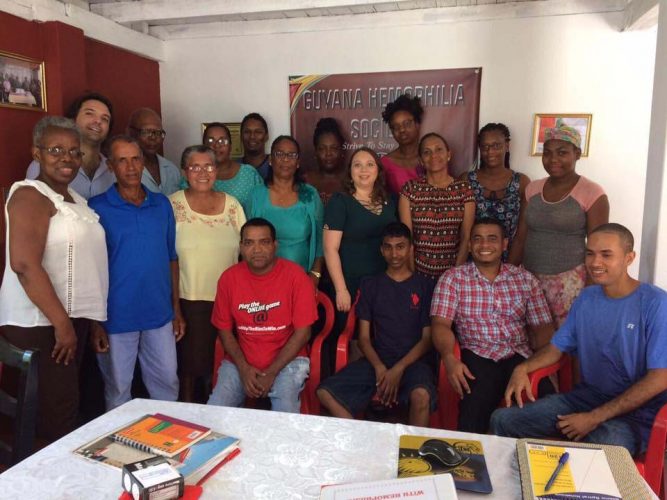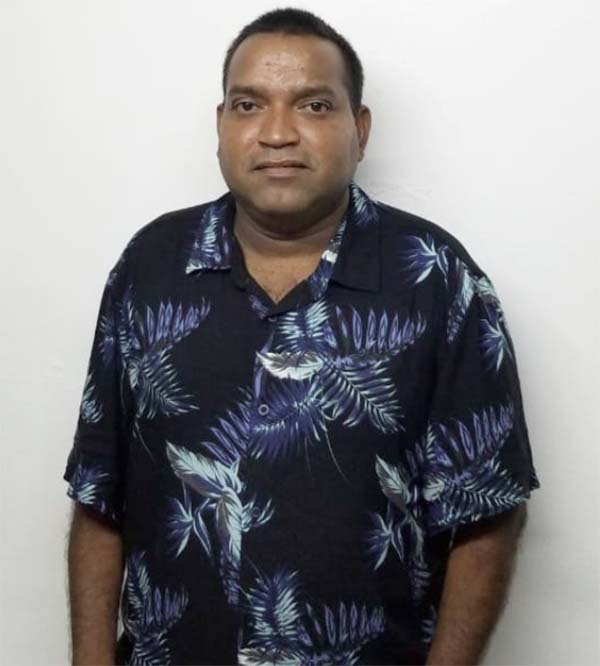When Looknauth Mohamed was a child his mother observed what she described as black and blue marks on his skin. Fearing that her son was being tormented by the Guyanese folklore creature known as the ‘Ole Higue’, she ‘gave away’ her only son to her neighbour at the time.
What Mohamed’s mother did not know then was that the black and blue marks were actually hematomas — bruising that occurs when an injury causes blood to collect and pool under the skin. She also did not know that her son had a condition, hemophilia, which would result in him living a very difficult life.

Mohamed credits his adoptive parents for doing all they could to assist him but they could not have shielded him from the pain he endured as a child, and which continued into adulthood, coupled with other unfortunate events as a direct result of that condition.
Now 42, Mohamed said not only has his wife left him because of the condition that saw him missing work for days and being hospitalized for extended periods, but he has also had many near-death experiences and at one time was even referred to as a ‘miracle patient’ because of how close he came to dying.
Hemophilia is an inherited bleeding disorder in which the blood does not clot properly. This causes spontaneous bleeding, and/or prolonged bleeding after an injury or surgery. People with hemophilia have low levels of specific clotting factors, which are proteins in the blood that help it to clot. Persons with low levels of Factor VIII (Factor 8) have Hemophilia A, and those with low levels of Factor IX have Hemophilia B.
The World Federation of Hemophilia (WFH) says that people with hemophilia do not bleed any faster than normal, but they can bleed for a longer time. Their blood does not have enough clotting factor, a protein in blood that controls bleeding. It was further stated that people with severe hemophilia usually bleed frequently into their muscles or joints and may do so one to two times per week. The bleeding is often spontaneous, which means it happens for no obvious reason. On the other hand, people with moderate hemophilia bleed less frequently, about once a month. They may bleed for a long time after surgery, a bad injury, or dental work. They will rarely experience spontaneous bleeding. People with mild hemophilia usually bleed as a result of surgery or major injury. They do not bleed often and, in fact, some may never have a bleeding problem.
Hemophilia is quite rare; about 1 in 10,000 people are born with it. The WFH’s Annual Global Survey surmised that with Guyana’s population of approximately 755,000 persons, an average of 52 persons could be living with and suffering from Hemophilia.
The Guyana Hemophilia Society (GHS) is extremely concerned that to date there are only 15 confirmed cases in Guyana.
Old Higue
Mohamed, who also now walks with a limp as a result of the condition, recalled that as a child he was always in a lot of pain and had black and blue marks on his skin.
“She hand me over to the people them opposite, because she didn’t know what been happening and she say like is old higue,” he said about his mother.
It was the neighbour who took him to a doctor, who diagnosed his condition. But he described his childhood days as “hell because as a child you don’t know how to take care of yourself properly and you would jump and so and it was pain.”
Were it not for his neighbours, who eventually adopted him and gave him their name, Mohamed said, he would have been “six feet under”. He said his adoptive parents spent a lot of money on him in an attempt to alleviate his suffering. He lived opposite his mother’s residence until he was about 16 years old before moving to Georgetown with his adoptive parents.
His biological mother is now dead and Mohamed said he does not hate her for giving him away as not only was she unable to properly assist him but his adoptive parents gave him a new lease on life.
He said he is well known at the Georgetown Public Hospital (GPH) because of the countless times he has been hospitalized.
As an adult, Mohamed said, he worked for many different companies, including a pharmacy and a bakery, but because of his condition, which has seen him being away from work for extended periods, it has been difficult to hold down a permanent job. He also got married but because he was hospitalized for long periods his marriage did not last. He recalled that after one hospitalization he returned home to find that the lock on the gate had been changed and all he received was his clothes. He lost everything but is still grateful for life.
Today he does not work but receives support from his adoptive siblings, who live overseas; their parents have since passed away. He hopes to be granted a piece of land, for which he has applied, so that he would be able to own his own home.
Carrier
Mohamed believes he got the condition from his mother; he has three biological sisters, none of whom had any symptoms of the condition. Today, however, he has a nephew who suffers from the condition so badly that he uses a wheelchair to move around as he cannot walk. According to Mohamed, his sister did not know how to take care of her son, who was not diagnosed as a child, and he therefore sustained many injuries and eventually lost his mobility.
According to the US Centers for Disease Control and Prevention, a father who has hemophilia passes his X chromosome to all of his daughters, so they have his hemophilia allele and become heterozygous (carriers). A father passes his Y chromosome to his sons and thus cannot pass the hemophilia allele to them. Without the hemophilia allele, the sons therefore cannot pass it to their children.
Hemophilia is more common among boys, as they only inherit one X chromosome, which means that they will develop symptoms of hemophilia if that chromosome carries the mutation.
Mohamed is grateful for the GHS, through which he receives the Factor VIII injection that allows him now to lead a relatively normal life. Prior to accessing the injection, if he got so much as a cut when shaving it meant that he had to be hospitalized.
“As a hemophiliac, I was in the hospital and out, in and out but thank God for the factor eight injection that we now getting so that I don’t have to be in the hospital anymore… I just have to go to any health centre and let them give me it,” he said.
Before he started taking the injection, Mohamed said, there were many instances when he needed blood and there were times when the blood bank did not have his blood type and he just remained in the hospital bleeding out.
“It was a horrible thing and going to the hospital every time was also very expensive and to upkeep a hemophiliac, it is expensive because you have to eat well and buy things to build up your blood regularly,” he shared.
It was during one of his hospitalizations that the doctors found that nothing was stopping his bleeding. Contact was made with the GHS which was looking for people for trials with the injection.
It was administered and the bleeding stopped.
He pointed out that the medication is provided by the WFH through the GHS and he lamented the fact that the government has played no role in reducing the plight of those living with hemophilia. He hopes that his story and those of others will engineer change at the level of the government so as to ensure that every Guyanese living with hemophilia will not only have access to the needed injection but that people would be sensitized about the condition and come forward to be diagnosed if the need arises.
He is fearful that one day the WFH will be unable to donate the injection and he would be back to square one and so he appealed to the government to assist people living with hemophilia. The injection is required twice a week. He receives it through the GPH, stores it in his refrigerator and goes to a health centre to have it administered.
Mohamed was high in praise for the doctors who have treated him over the years at GPH and also for the support he has received from members of the GHS.



